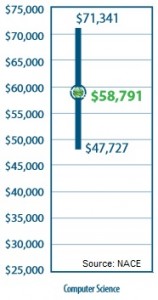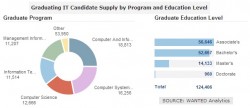 This year, U.S. colleges will graduate somewhere around 124,000 information technology majors.
This year, U.S. colleges will graduate somewhere around 124,000 information technology majors.
Most of them (61 percent) will head straight into the workforce, where the average starting salary for these new grads averages $59,000. Those with masters and PhDs, and those in high-demand specialties like security, will earn much more.
Where they want to work is not much of a surprise: Google, Microsoft, Apple, Amazon, and Facebook top the list of their ideal employers, according to a Universum survey.
Besides having the advantage of an internationally known brand — of the 100 employers on Universum’s list, not one can be considered even a mid-sized company — the biggest employers have been scouting colleges for months; a few began nurturing their future candidates when the kids were still in high school. Now, with graduation looming, these employers have largely completed filling their incoming IT class of 2014.
Competing with the big name firms is not easy, agree Chris Jenkins and Lindsay Kulla. “It’s always tough competing with the Facebooks, Google, Amazons,” says Jenkins, who is senior recruiting manager for kCura, a young Chicago software firm that serves the legal industry.
Visiting colleges, hosting tours, meeting with students, “Whatever we can do to keep our brand and company image” in front of them, says Jenkins.
Kulla, the firm’s campus recruiting lead, spent a good part of the fall and winter at Chicagoland colleges. Hitting all the job fairs and career days is part of showing the flag, she says, building awareness among the tech students, few of whom will otherwise have heard of kCura.
 That, though, is only the beginning of the firm’s recruiting efforts. When you have 150 new jobs to fill in a matter of months, you use all your assets. Besides the on-campus activity, kCura’s recruiters are involved in Chicago’s tech community, Jenkins says, attending events and hosting tours at company headquarters.
That, though, is only the beginning of the firm’s recruiting efforts. When you have 150 new jobs to fill in a matter of months, you use all your assets. Besides the on-campus activity, kCura’s recruiters are involved in Chicago’s tech community, Jenkins says, attending events and hosting tours at company headquarters.
Last fall, 80 students toured kCura, meeting with members of the various teams who could be their future colleagues and engaging them in Q&A about the culture and the projects they work on. The projects may not have the visibility of a Facebook feature or a new Google app, but, says Jenkins, “From a tech perspective we are dealing with some pretty technical projects.”
And, being new and rapidly growing, new hires get involved from day one. “A lot of people want to work in a more entrepreneurial environment,” says Jenkins. Those tours help communicate that culture and show kCura as an exciting place to work. When they start work, each new hire is assigned a “buddy,” sort of an immediate friend, who helps them acclimate and immerses them in the company culture.
That culture gets a knock on Glassdoor, where the company has a middling 2.5 rating, and fewer than half the reviewers say they’d recommend the company to friends. It’s a challenge that Jenkins and Kulla say the company has been addressing. “We take all of our feedback (seriously),” Jenkins says, and have made some adjustments to the company’s policies to create a better work/life balance.
Despite what the rating might suggest, a big part of kCura’s recruiting success is due to the employees and hiring managers who spread the word about the company. Kulla says one of her recruits first heard about the company from “a gentleman at a coffee shop.” Employees are involved in the greater tech community and often refer people to the recruiting team.
Hiring managers work closely with recruiters, not only encouraging referrals but routinely providing feedback on the candidates they interview to help refine the recruiting process. “Our hiring managers are team players,” Kulla agrees. “They are extremely receptive.”
Uniquely, kCura trains nearly everyone in interviewing skills and techniques. So far, 215 of the company’s 375 employees have gone through the training, which includes reminders about referrals. Managers are active participants, says Jenkins, because “it’s understood that recruiting has to be a top priority.” It also helps that that the CEO and company leaders are not only in agreement, but drive that process.
Barely two months into the year when we spoke, Jenkins says it’s a strong measure of kCura’s recruiting success that more than 50 positions were already filled. To be sure, the company doesn’t win all the students it pursue, but three out of every five offers it makes are accepted. It shows, Jenkins says, “That you can be successful recruiting against the big boys.”
 kCura’s formula is straightforward; there’s no “magic bullet,” as Jenkins put it. Perseverance is part of it, as is the relationship-building of the recruiters; it also makes a difference to pursue students at colleges that aren’t being trolled by the top companies, the same way they do the Stanfords, MITs, and other big name schools.
kCura’s formula is straightforward; there’s no “magic bullet,” as Jenkins put it. Perseverance is part of it, as is the relationship-building of the recruiters; it also makes a difference to pursue students at colleges that aren’t being trolled by the top companies, the same way they do the Stanfords, MITs, and other big name schools.
For every computer science major at those schools, hundreds more graduate from schools like the University of Maryland-University College.
Wanted Analytics recently compiled a list of the schools with the most graduating tech students, and released the top four with their numbers:
- University of Phoenix-Online Campus (5,765)
- University of Maryland-University College (1,494)
- Ivy Tech Community College (only associate’s degrees are awarded; 1,083)
- DeVry University-Illinois (859)
Most IT graduates complete coursework in computer and information sciences and computer systems networking and telecommunications, Wanted reports.
Some of the Related Conference Sessions at the ERE Recruiting Conference in San Diego:
- Revamp Your College Recruiting Program Now: An Imperative Given the New World of Higher Education, Wednesday, April 23, 2 p.m.
- Recruiting Tech Talent: Critical Strategies, Tools, and Technologies for Winning the Toughest War for Talent, Wednesday, April 23, 2 p.m.